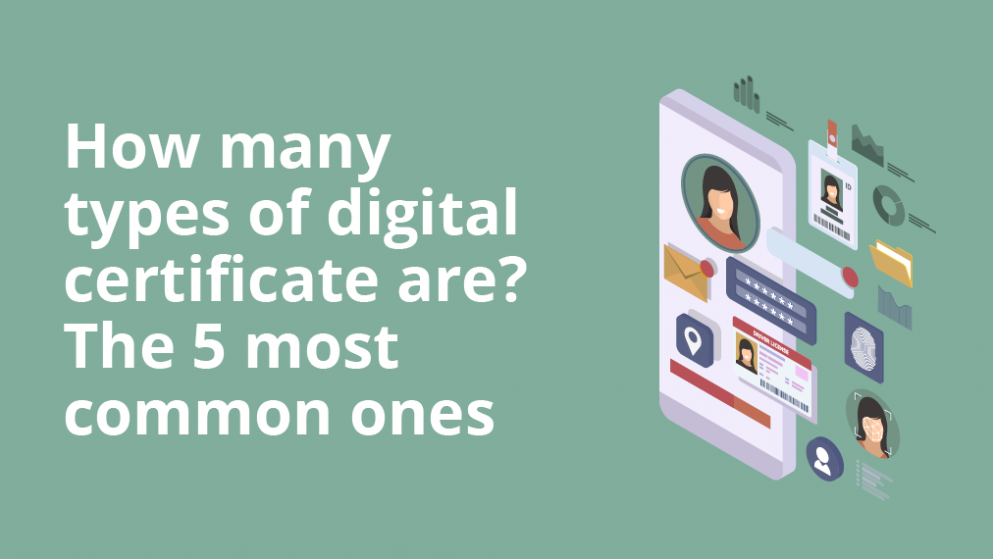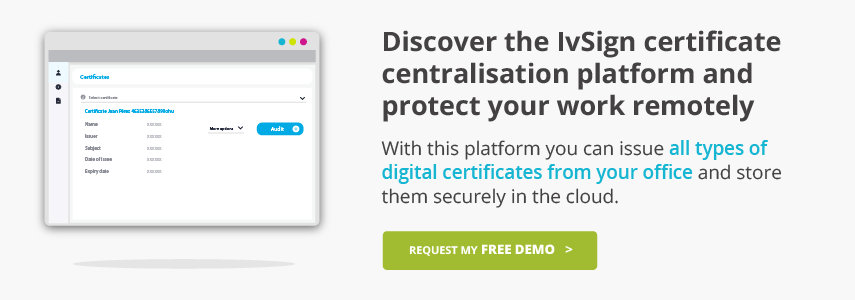
How many types of digital certificate are? The 5 most common ones
Escrito por: Marketing Team Fecha Monday 23, November 2020 Categoría: Uncategorised
What is a certificate, why do I need one, what types of digital certificate exist? These are some of the questions that many companies ask themselves when they need to be identified electronically.
A digital certificate is a document that guarantees a person’s identity on the Internet and allows them to carry out actions such as signing documents or accessing electronic offices. For this reason, it is now essential for companies and professionals to have a certificate in order to be able to carry out their work.
If we do not have a digital certificate, we must go to a Certification Authority, recognised as a Trusted Service Provider, to issue one. It is important to do so with an officially recognised entity to ensure that the identity of the owner, the integrity of the message and the non-repudiation of electronic transactions are guaranteed.
There are different types of certificate depending on the tasks you want to do with it. In this post we tell you about the most common ones.
Types of digital certificate
When we work online and need to identify ourselves with a digital certificate, we must first ask ourselves what we need it for. So that you can choose the right type of certificate at any given moment, here are the most commonly used types of digital certificate and the tasks they are used for:
- Certificate of Representative to the Public Administrations: This type of qualified digital certificate allows to carry out online procedures with the Public Administrations. For example, when filing and settling taxes, applying for subsidies, administrative files, submitting applications for public contracts… It can be used by legal representatives and authorised representatives with sufficient powers to represent an organisation, with the responsibility of using it in accordance with their powers.
- Corporate certificate. This is a certificate that electronically identifies a natural person and links them to an organisation or entity, giving information on the position they hold in it (employee, associate, collaborator, client or supplier). The holder can communicate using the digital signature, but does not have the power of representation.
- Legal Representative Certificate: qualified certificate that allows a natural person with general powers of representation to act on behalf of an entity or organisation. It is a combination of the two previous types of digital certificate, as it allows administrative procedures to be carried out online and digital documents to be signed. It can therefore be used by legal representatives or proxies with general powers of attorney.
- Proxy certificate: this type of digital certificate is intended exclusively for special proxies. It allows them to act on behalf of an organisation or entity for online procedures with the Public Administrations and to use the digital signature. Thus, natural persons with special powers of attorney over an organisation can be holders. They will be responsible for using it in accordance with their powers and limitations.
- E-Stamp Certificate: the qualified E-Stamp certificate allows a legal entity to identify itself online and make electronic signatures without the need to incorporate the details of a representative. It is suitable for cases in which a signature and authentication are required in automated processes, for example for the generation of receipts or invoices. The certificate can be associated with a private encrypted key to guarantee the integrity and authenticity of the signed documents.
Ivnosys, a Qualified Trusted Service Provider
At Ivnosys we have more than 15 years of experience in the field of digital identity security. Are you an IBEX company, an SME or a freelancer? Discover IvSign. Request a demo or ask us what you need.





